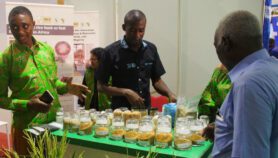By: Priya Shetty
Send to a friend
The details you provide on this page will not be used to send unsolicited email, and will not be sold to a 3rd party. See privacy policy.
A UNITAID patent pool could revolutionise HIV treatment and research in developing countries — if payment can be agreed, says Priya Shetty.
When GlaxoSmithKline set up a patent pool earlier this year to stimulate research into neglected diseases, it was little surprise that they excluded patents for their extremely lucrative HIV drugs.
But there is a strong humanitarian case — now promoted by the health organisation UNITAID — for pooling HIV drug patents. A UK parliamentary group on AIDS estimatesthat by 2030, 50 million people will need HIV drugs. Already, over six million people with HIV/AIDS are dying because they have no access to lifesaving medicine.
UNITAID's proposed patent pool could change all that. It would work by collecting patents held by companies, universities or research institutes and making them available to the developing world for drug production or research at the cost of an affordable licence fee or royalty.
This differs from the way drug patents usually work. When a company creates a new drug, the patent protection lasts about 20 years. It prohibits other companies from producing and selling the drug or using it for research. Occasionally, the patent-holder may give other organisations access to its protected knowledge, but usually only in an extremely restricted capacity and at high cost — which puts low and middle income countries out of the running.
Patents ensure maximum profits and allow companies to recoup the millions of dollars they spend getting a drug to market. But they also mean that people who can only afford cheap 'generic' copies of drugs must wait decades. And researchers cannot develop new combination treatments — recommended by the WHO as the best way to reduce the risk of drug resistance — if one of the drugs is under patent.
The UNITAID HIV patent pool would mean generics could be made immediately, and research could begin into new drug combinations and child-friendly formulations.
Right idea, right time?
Patent pools aren't the only way of ensuring the developing world has access to drugs. Some countries, like Brazil, India and Thailand, have issued compulsory licences to allow manufacturers to produce generic versions of patented drugs. These nations are as aggressive in protecting their right to make cheap life-saving medicines as pharmaceutical companies are in protecting their share prices.
But compulsory licensing is a difficult path, fraught with complications including legal actions from pharmaceutical companies. And while it makes existing drugs affordable, it doesn't stimulate research. UNITAID's patent pool could revitalise innovation, saving lives in the developing world.
And there's good reason to believe that the organisation can make a pool work. UNITAID has a track record in lowering the cost of HIV/AIDS drugs through bulk purchase agreements. It also has the expertise of Ellen 't Hoen, a key ex-member of the Access to Medicines campaign Médecins Sans Frontières uses to improve poor people's access to antiretrovirals.
Some pharmaceutical companies are also, at least in principle, coming round to the idea. Johnson and Johnson, Gilead, and Indian generics-maker Cipla have been openly supportive, and Novartis and Merck are reportedly in talks with UNITAID. Even GlaxoSmithKline, in a recent letter to the UK's Guardian newspaper, say they haven't ruled out joining the patent pool.
Payments and prizes
But UNITAID still needs to come up with an incentive for the companies to join — they are unlikely to do so from corporate goodwill alone.
Current proposals focus on royalty payments for voluntary patent contributions.These royalties would "not be insignificant", 't Hoen told SciDev.Net. But given the enormous profits that HIV drugs can bring — Tenofovir costs £3,500 (US$5,500) in developed countries per patient every year — companies are unlikely to settle for royalties alone.
An alternative, proposed by the advocacy group Knowledge Ecology International, among others, is to create a multi-million dollar prize fund to tempt companies into joining the pool. Those who join the pool become eligible for prizes, which could, for instance, be allocated to companies that have the biggest effect on public health.
The idea is gathering support from some academics, as well as donors such as the Clinton HIV/AIDS initiative.
Some developing countries also support the idea. Bangladesh, Barbados, Bolivia, and Suriname have written to the WHO (who host and administer UNITAID) asking it to consider the prize fund/patent pool model. They suggest that ten per cent of donor drug purchase budgets go towards this fund, which could run to millions. No doubt, donors and nongovernmental organisations will dispute the exact percentage, or even the mechanism for financing the fund, but they and governments need come up with a workable plan before the momentum slips away.
UNITAID's proposal for a patent pool comes as the World Intellectual Property Organization (WIPO) is revitalised under new leadership. The new head, Francis Gurry, is trying to revive the organisation's development agenda, and 't Hoen said WIPO has offered UNITAID technical support.
UNITAID now need to make sure they successfully broker what could be a hugely important deal for the developing world.

Journalist Priya Shetty specialises in developing world issues including health, climate change and human rights. She has worked as a news editor at New Scientist, assistant editor at The Lancet, and commissioning editor at SciDev.Net.
This article was updated 1 October 2009. A previous version of this article stated that Mary Moran, head of the pharmaceutical research and development project at the George Institute in Sydney, Australia, supported the idea of a patent pool prize fund. This statement was incorrect.













